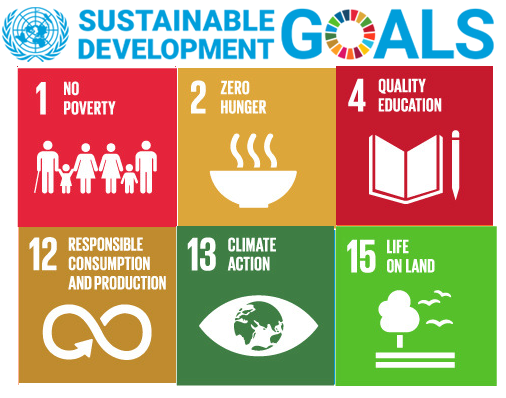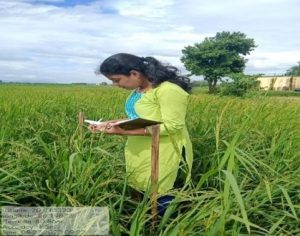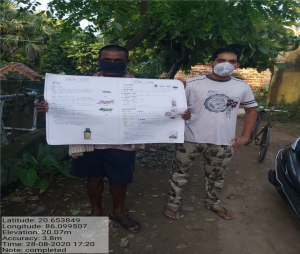



Overview:

M.S. Swaminathan School of Agriculture (MSSSOA) is located in Gajapati district in South Odisha that is among poorest districts of India. The livelihood of the residents of the district is primarily based on subsistence agriculture, forest produce, wage labour and distress migration. Apart from SDG 15 the school contributes significantly to SDGs 1,2,4,12 and 13.
As identified by the Food Security Atlas of Rural Odisha (2008), the zone of acute food insecurity in the state comprises Kandhmal, Malkangiri, Rayagada and Gajapati districts of Odisha. The Atlas also suggests that for the livelihood development of hill-forest-based population, following strategic interventions will be required.
Given the above context, MSSSOA has adopted the national agenda of doubling farmers’ income sustainably. It aims to develop a workforce that is exposed to domains such as precision agriculture and are able to leverage digital technology and data management to deliver transformative change in the socio-economic conditions of the farmers as well as contribute to the entire agri-value chain and research.
Centurion University has also incubated many social enterprises and outreach entities under the umbrella of Gram Tarang in the areas of employability enhancement, financial inclusion, agri-processing, last-mile supply chain and biotechnology.
MSSSOA is accredited with ICAR and has established close operational relationship with community and network of companies in agroindustry, NGOs and Government Organizations to enrich its educational offerings. It’s the top Agriculture college in Odisha as well as nationally.
Departments:
Whilst the MSSSOA has full-fledged departments for areas such as Agriculture Science, Entomology, Genertics and Plant breeding. Each of the departments is equipped with requisite facilities such as laboratories and smart classrooms, they also collaborate with other schools on campus such as Engineering & Technology to ensure holistic learning. Each department has well qualified, dedicated and experienced faculty, supplemented by industry expert and global content.
Support for Placements and Higher Studies
University has a dedicated career counselling and training cell that ensure that the students are able to individually identify and are prepared to effectively realize their career aspirations. These could range from securing a job, start their own enterprise and/or pursue higher studies. Extra classes are arranged throughout for various competitive examination such as JRF and GATE. Besides this, the students are supported to achieve English proficiency, reasoning and quantitative ability levels required irrespective of their career aspirations.
Campus:

Campus has multiple sports facilities such as international standard basketball and tennis courts, flood lit multi-purpose playground and cricket practice pitches. Besides our dedicated hostels and mess facilities, campus also has multiple shops/marketplaces that act as excellent locations for the students to meet and socialize with their peers.
Other facilities also include dedicated banking counter, ATM as well as a dispensary (with a doctor and three paramedical staff and an ambulance).
Library:

Accommodation
Being a residential program, the School encourages students and faculty to live on campus. There are dedicated hostels for boys and girls offering multiple configuration/options. About 80% students and 50% faculty and supporting staff stay on campus. There are 10 hostels (6 for boys with 304 rooms accommodating 1021 students and 4 for girls with 104 rooms accommodating 318 students).
Clubs and Extra Curricular Activities:
Besides extensive sports facilities and events, there are student run Health Club, Yoga Club, Adventure Club, Meditation Club and Karate Club under the guidance of respective faculty in-charges. The students regularly participate in cultural, NSS, NCC and other socially responsible activities.
Key Highlights
READY Program:


This programme includes five components i.e.

Experiential Learning (EL) helps the student to develop competence, capability, capacity building, acquiring skills, expertise and confidence to start their own enterprise and turn “Job Creators instead of Job Seekers”. This is a step towards “Earn while Learn” concept.
The Rural Awareness Works Experience (RAWE) helps the students primarily to understand the rural situations, status of technologies adopted by farmers, prioritize the farmers’ problems and to develop skills and attitude of working with farm families for overall development in rural area.
Rural Agricultural Works Experience:

All the activities thoroughly monitored by Guides and Supervisor through online and online platform called learning record was developed. All the presentation and evaluation conducted by online mode. This programme undertaken by the students during the VII semester for a total duration of 20 weeks with a weightage of 0+20 credit hours in two parts viz., RAWE and AIA. It consist of general orientation and on campus training by different faculties followed by village attachment/unit attachment in University/ College/ KVK or a Research station.
The students attached with the agro-industries to get an experience of the industrial environment and working. Weightage in terms of credit hours will be given depending upon the duration of stay of students in villages/agro-industries. At the end of RAWE/AIA, the students given one week time for project report preparation, presentation and evaluation.
Sharing land with students at Bagushala farm:

In Bagushala, the students learn farming and a lab was constructed in 2014 where the students can perform their practical related to agronomy and crop development. Here students are allotted a specific amount of land.
The students grow crops in that allotted land and learn the agricultural practices. The area of the farm is around 5 acres with sufficient supply of water to the field. For transport, a farm road has been constructed which can improve the accessibility by the locals and students. College bus, tractors and other farm machinery can be accessed easily through a wide farm road.
All the land is being used to grow crops like rice, maize, shorgham, bajra, finger millets, proso millet and horticultural species under different treatments and trials. The organic farming is one of the important trials under the land sustainability.
Through the organic farming restoration and conditioning of soil can be achieved by applying natural input to the field. The treatments with different biodegradable input in the organic farming were studied and the maximization of yield of the product was analyzed.
Forest grazing :
The concept of forest grazing came into enforcement looking towards the problems associated with reduction of grazing lands. Due to expansion of human activities, policies related to forest land conservation were also implemented and then came concept of forest grazing to support the small and marginal farmers. Forest grazing is a common strategy followed by small and marginal farmers having livestock to increase the quantity of pasture, either temporarily or permanently, and provide their livestock essential micro and macro minerals. Several factors affect the strategy that includes forest age, composition, and the level of management provided. These factors are important as they alter the forest canopy which intercepts sunlight before it reaches the pasture, thus strongly influencing productivity of the pasture.
Centurion university campus is close to the forest land on hill tops, which is a beauty of the campus maintaining ecosystem and biodiversity. The nearby villagers depend upon livestock and agriculture farming for their livelihood support, where the university play a key role through providing them forest grazing lands. Due to forest grazing, the major benefit obtained is weeds destruction, since these are the major obstacle in achieving optimum growth of vulnerable forest plants. Also, the soil gets soften and mineralised through cow dung and urine during grazing. This leads to bilateral benefit both to the farmer and forests though reduction of feed cost and maintaining the ecosystem near university campus respectively.
The Forest department has been working over years together to improve these forest pasture land ecosystems. Our university has pooled resources, knowledge, and instituted science-based management practices for sustainable livestock feeding and forest plant management through rotational grazing in the midst of different patches of forest pasture lands. We have constructed number of walking roads into the dense forest for easy and secure movements. The cattle and buffaloes of nearby villagers are usually allowed for forest grazing inside the campus. Rotational grazing of six month is being practiced to reduce the incidence of helminthic infections, which is an aid to health management. The forest grazing is being done following “the Orissa Forest (Grazing of Cattle) Rules, 1980”. The forest grazing also helps to supply good amount native fodder / grasses to the animals and thus help in maintain a good health and productivity. There is watering system provided at an interval through various ponds being maintained by fishery department, Centurion University that make the grazing more effective and long time in the forest areas. Also salts / other mineral supplements are being sprayed in different area over the pasture land in forested areas which attract the cattle and buffalo and thus encourage for grazing. Centurion University facilitates forest grazing.
Reports addressing various sustainability goals: